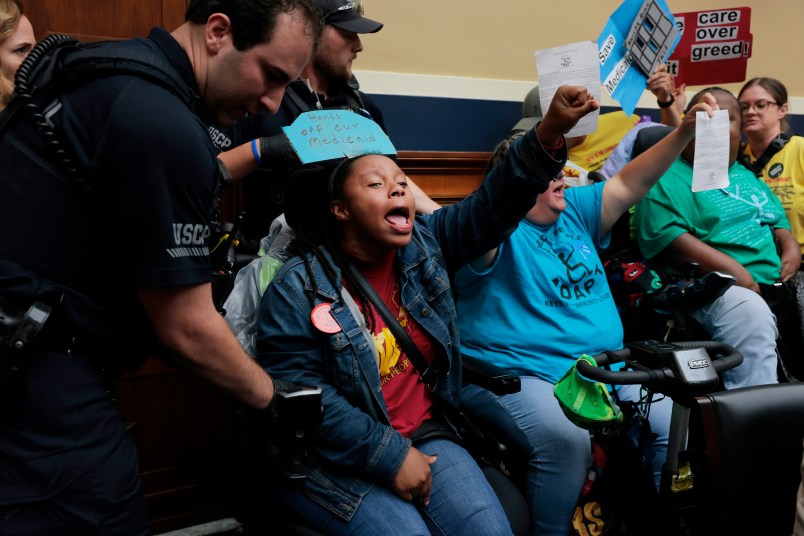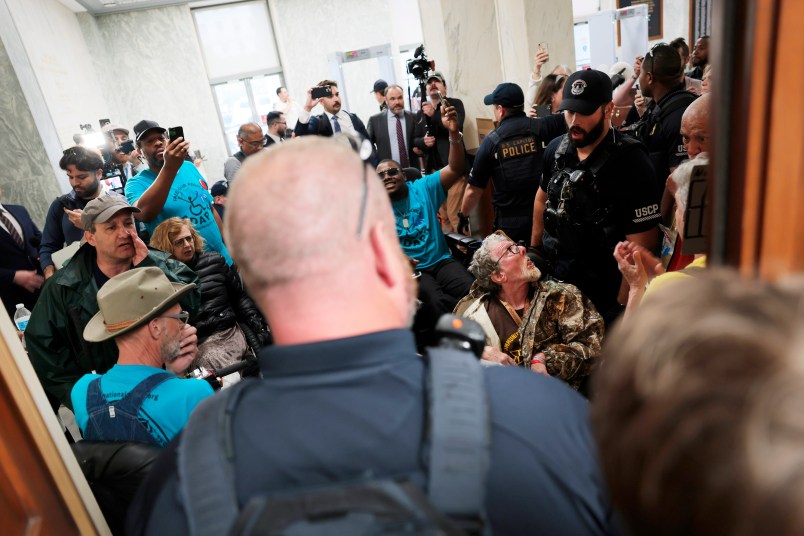The House Energy and Commerce Committee met Tuesday afternoon to begin discussing committee Republicans’ budget markup, which will enact sweeping cuts to Medicaid as they try to slash $880 billion over 10 years from programs under their jurisdiction.
While little of the proposed Medicaid slashing had been discussed 10 hours into the meeting, tensions were high and bipartisan outrage over House Republicans’ efforts to gut the social safety net program was on full display.
Before the markup began, there were protests outside the hearing room. The crowd was made up of constituents of all political backgrounds. Half an hour before the meeting began, the corridors of the Rayburn office building were already lined with dozens of protesters, many in wheelchairs, with T-shirts and pins marking their support for Medicaid.
A protester waiting outside the hearing room was wearing a “Hands Off Medicaid” t-shirt while holding a “Make America Great Again” canvas tote bag.
Another protestor said she had been waiting since 4:30 a.m. ET to get one of the few seats available to the public in the hearing room.
She did get in, just to be removed minutes into the hearing after interrupting it with chants protesting Medicaid cuts alongside a handful of other protestors.

The start of the markup was delayed by the large group of protestors in the hall, again, many of them in wheelchairs, and some of whom were trying to enter the hearing room. Police officers barricaded the doors from the outside, while House staff members held onto the doors from the inside.
Chants of protestors and whistles from Capitol Police officers trying to break up the crowd could be heard from inside the hearing room.
The markup started at 2:06 p.m. ET. Ten hours in, minus a short break members took to attend floor votes, the committee had not even begun discussing the health and Medicaid-related amendments that Democrats plan to propose. Some Democrats saw the move as intentional.
Committee member Rep. Nanette Barragán (D-CA) apologized to the public for the Republican-controlled committee’s unwillingness to prioritize the health portion of the markup, despite dozens of people showing up to hear discussions about the proposed cuts to Medicaid.
Barragán called Republicans’ decision to push the Medicaid portion into the late hours of the night “intentional” and “shameful.”
Several Senate Democrats, including Sen. Cory Booker (D-NJ), and House Minority Leader Hakeem Jeffries (D-NY) popped into the committee markup throughout the day to signal their support for Democrats on the panel who will be stuck in the meeting for likely another 18 hours.
“The public effort to take away healthcare from the American people in order for them to provide their billionaire donors, like Elon Musk, with massive tax breaks is not something that will be well received by the American people,” Jeffries (D-NY) told reporters as he left the hearing room after a brief appearance at the markup late Tuesday night. “It will be rejected. And many of the members who are going to vote for the largest Medicaid cut in American history will not be back after the 2026 elections.”
House Republicans’ Attack On Provider Taxes
In their proposed markup, House Republicans did leave the more controversial proposals around reducing the 90% federal matching rate for the Medicaid expansion population and implementing per capita caps out of the markup. Instead, they included a less discussed tactic in the legislative text that will still lead to massive Medicaid cuts: they want to curb states’ ability to levy taxes on healthcare providers.
Medicaid is jointly financed by the federal government and states. And under federal law, states are allowed to finance their part of Medicaid spending through multiple avenues, including health care related taxes often referred to as provider taxes.
Federal requirements allow states to impose provider taxes on 19 classes of health care providers, including nursing facilities, hospitals, and intermediate care facilities for individuals with intellectual disabilities, according to the Congressional Research Center.
Currently all states except Alaska use revenues from some form of provider taxes to finance part of their state’s share — often through taxing a percentage of the health care providers’ revenue or using a flat tax on, for example, the number of beds in the facility or inpatient days.
The House Energy and Commerce Republicans’ markup text includes a provision that would put a moratorium on new or increased provider taxes, a proposal that is expected to be discussed at some point during this hearing, though it is unclear when.
This would mean that Alaska won’t be able to adopt a provider tax and other states can no longer increase their provider taxes Allison Orris, Director of Medicaid Policy at the Center on Budget and Policy Priorities, told TPM.
This would create significant financial struggles for states as over the years they have had to adjust and increase their tax rates to provide cover for increasing Medicaid payment rates. A Government Accountability Office report shows that reliance on provider taxes grew significantly over a decade, increasing from 7% in 2008 to 17% in 2018.
“This just takes an important tool that states use to design their Medicaid budget, away from the states,” Orris said.
Restricting provider taxes will force states to make difficult decisions around eligibility and benefit cuts to existing programs or scramble to find other financing options in their tight budgets to cover the cost themselves. Without a way to replace the money they make from provider taxes, which many states won’t be able to come up with, millions will lose access to healthcare.
Other Medicaid Cuts And MAGA Policies
We have previously reported that House Republicans have largely coalesced around several options that they see as cost saving plans: imposing work requirements, more frequent eligibility checks and tightening rules to ensure that undocumented immigrants, who are already not eligible for the program under the federal law, cannot receive any of its services.
Energy and Commerce Republicans followed through on those plans this week.
The markup text includes plans to implement work requirements with a provision that would allow states to require individuals to demonstrate work-related activities for one or more consecutive months before they can be eligible for healthcare.
Republicans did provide a long list of exceptions for work requirements, but exemptions don’t always prevent people who qualify from losing access to coverage, according to experts.
Energy and Commerce Republicans’ plans also include more frequent eligibility checks: every six months instead of the current every 12 months standard for the Medicaid expansion population.
The markup text also proposes scaling back the federal funding matching rate for states that choose to use state funds to offer coverage for undocumented people, defunding Planned Parenthood and prohibiting the use of federal funds for gender affirming care for minors.
“Their effort to jam these extreme, right-wing policies down the throats of the American people are all going to be rejected one way or the other, if not by Republicans in Congress who would rather do the right thing then by the American people who will hold them accountable for their extremism,” Jeffries told TPM.







I think Democrats are right, someone will notice those cuts Republicans are going to enact.
That said, I am still waiting for normal political gravity to take hold. To clarity, I am sure it will, but it might take longer than we might expect, even at this point.
In the mean time, kudos to the protesters.
Great work Emine explaining a difficult in terms "regular non-news following folks can understand yet enough detail to satisfy the more wonky.
It is frustrating to see how stupidly the tariff discussion has been handled by the news. For example, Brad DeLong has tried to look at costs over the entire value chain. Only then does the impact of Trump’s folly begin to kick in. Similarly, a healthy society requires many things, not just some medical interventions from time to time. It means healthy babies, longevity with few health issues, safe neighborhoods and good housing, clean air and water, no microplastics in your brain or testicles, nutrient-rich diets. Trump won’t even explain his own health issues. For example, why is he risking the use of a GLP-1 agonist like Ozempic when he doesn’t have diabetes? And what’s that thing on his nose? Or the hunched lumbering gait? Why not something like health for all at all ages with national health insurance for all? Of course you can cut national healthcare programs, but there needs to be some rational basis beyond making our 800 or so billionaires a bit richer.
All that effort to avoid town halls and people still found out about their plans.
Sad.
Since the work requirement seems to be waved about by many - myth that it is - I suspect that will be the first thing agreed to. Including by Dems.
From Center for American Prgress:
5 Facts About Medicaid Work Requirements
Medicaid work reporting requirements do not promote employment; they create red tape that takes health care away from eligible people, leaving them uninsured.
And this:
Millions of working Medicaid recpients will lose coverage due to reporting requirements. You need a computer or smartphone and wifi (don’t forget, TFG tanked the broadband for rural/underserved areas as being DEI). Or they are required to appear in person, in a not local office, and would have to take time off work to do so.